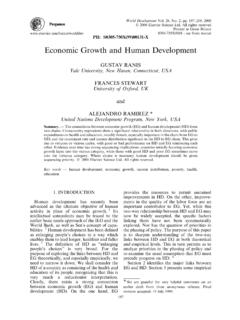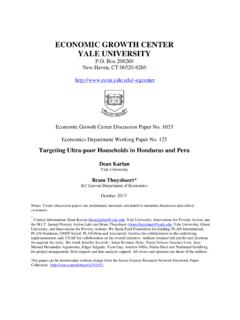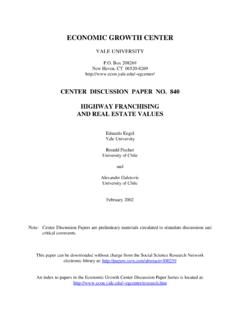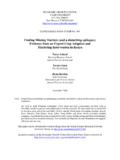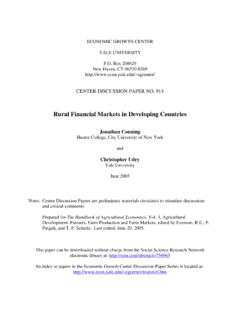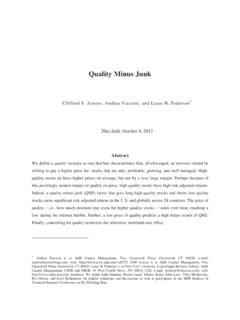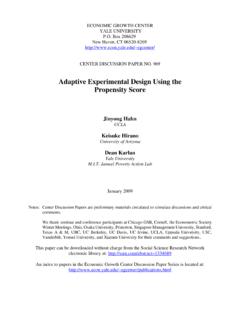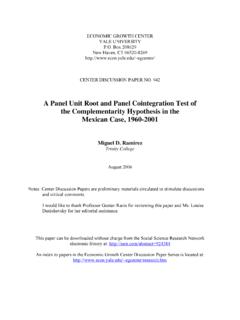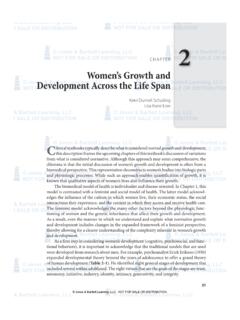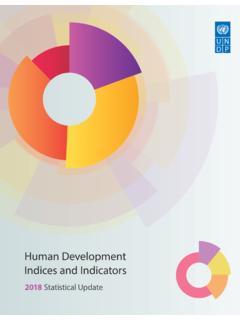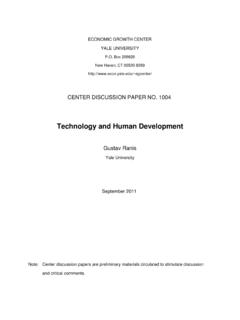Transcription of HUMAN DEVELOPMENT AND ECONOMIC GROWTH
1 ECONOMIC GROWTH CENTER. YALE UNIVERSITY. Box 208269. New Haven, CT 06520-8269. ~egcenter/. CENTER DISCUSSION PAPER NO. 887. HUMAN DEVELOPMENT AND ECONOMIC GROWTH . Gustav Ranis Yale University May 2004. Notes: Center Discussion Papers are preliminary materials circulated to stimulate discussions and critical comments. The assistance of Dan Keniston and Tavneet Suri is gratefully acknowledged. This paper can be downloaded without charge from the Social Science Research Network electronic library at: An index to papers in the ECONOMIC GROWTH Center Discussion Paper Series is located at: ~ HUMAN DEVELOPMENT and ECONOMIC GROWTH Gustav Ranis Abstract Recent literature has contrasted HUMAN DEVELOPMENT , described as the ultimate goal of the DEVELOPMENT process, with ECONOMIC GROWTH , described as an imperfect proxy for more general welfare, or as a means toward enhanced HUMAN DEVELOPMENT . This debate has broadened the definitions and goals of DEVELOPMENT but still needs to define the important interrelations between HUMAN DEVELOPMENT (HD) and ECONOMIC GROWTH (EG).
2 To the extent that greater freedom and capabilities improve ECONOMIC performance, HUMAN DEVELOPMENT will have an important effect on GROWTH . Similarly, to the extent that increased incomes will increase the range of choices and capabilities enjoyed by households and governments, ECONOMIC GROWTH will enhance HUMAN DEVELOPMENT . This paper analyzes these relationships and the two-way linkages involved. Keywords: ECONOMIC GROWTH , HUMAN DEVELOPMENT JEL Codes: O15, O11. HUMAN DEVELOPMENT and ECONOMIC GROWTH Gustav Ranis Yale University . Recent literature has contrasted HUMAN DEVELOPMENT , described as the ultimate goal of the DEVELOPMENT process, with ECONOMIC GROWTH , described as an imperfect proxy for more general welfare, or as a means toward enhanced HUMAN DEVELOPMENT . This debate has broadened the definitions and goals of DEVELOPMENT but still needs to define the important interrelations between HUMAN DEVELOPMENT (HD) and ECONOMIC GROWTH (EG).
3 To the extent that greater freedom and capabilities improve ECONOMIC performance, HUMAN DEVELOPMENT will have an important effect on GROWTH . Similarly, to the extent that increased incomes will increase the range of choices and capabilities enjoyed by households and governments, ECONOMIC GROWTH will enhance HUMAN DEVELOPMENT . This paper analyzes these relationships and the two-way linkages involved. It will first review some of the theoretical debates on EG/HD linkages, then review the conclusions suggested by empirical analysis. Finally it will examine the policy implications of these linkages. Section II discusses the case for HD and what produces HD. Section III discusses similar issues for EG, and Section IV concludes, analyzing the two-way relationship between them. II. GROWTH and its Impact on HUMAN DEVELOPMENT HUMAN DEVELOPMENT finds its theoretical underpinnings in Sen's capabilities approach which holds a person's capability to have various functioning vectors and to.
4 The assistance of Dan Keniston and Tavneet Suri is gratefully acknowledged. enjoy the corresponding well-being achievements to be the best indicator of welfare (Sen, 1985). This perspective shifts the analysis of DEVELOPMENT to the vector of not only attributes (as is the more traditional utilitarian or even the original basic needs view of HUMAN welfare, see Streeten, 1979), income, education, health, but also the vector of possible opportunities available to individuals in a particular state. Naturally, there is a link between the two--these opportunities are affected by certain attributes of the individual: a starving or uneducated person would have fewer choices than a healthy, educated person. Yet the capabilities approach goes far beyond individual attributes to analyze the role of the social environment on HUMAN choice and agency: an individual in an open, free society would enjoy a larger set of potential functionings than one in a closed, oppressive society.
5 However, while capabilities make an appealing goal for DEVELOPMENT , they are notoriously difficult to measure in that the full set of possible HUMAN functionings is almost by definition unobservable. The first major attempt to translate the capabilities approach into a tractable ranking of nations came in the 1990 UNDP HUMAN DEVELOPMENT Report. The HDR's objective was to capture better the complexity of HUMAN life by providing a quantitative approach to combining various socio- ECONOMIC indicators into a measure of HUMAN DEVELOPMENT (UNDP 1990). This was in contrast to the perceived prevailing wisdom in DEVELOPMENT economics, as embodied in the World DEVELOPMENT Reports, whose excessive preoccupation with GNP GROWTH and national income accounts has supplanted a focus on ends by an obsession with merely the means (UNDP 1990). Yet the transformation from a normative theory of capabilities into a quantitative variable was by no means an obvious task.
6 The use of life expectancy, literacy, and GDP as 2. components of a HUMAN DEVELOPMENT Index admittedly constitutes a rough proxy and simplification of the original capabilities Notably missing were measures of political freedom and income inequality. Furthermore, any quantitative ranking raises difficult empirical questions, such as accounting for the decreasing marginal utility of income, and the necessarily arbitrary weighting of each component of HD. Nevertheless, the HDRs have had a strong influence on DEVELOPMENT thinking, causing developing countries to publish their own national-level HUMAN DEVELOPMENT reports and indices and modifying their policies. Income GROWTH clearly strikes one as the main contributor to directly increasing the capabilities of individuals and consequently the HUMAN DEVELOPMENT of a nation since it encapsulates the economy's command over resources (Sen, 2000). For example, while the citizens of the Indian state of Kerala have life expectancies and literacy rates comparable to those of many developed countries, the fact that they cannot enjoy many of the benefits of citizens of such countries (such as better housing, transportation, or entertainment) demonstrates the importance of GDP as an instrument for achieving a wide range of capabilities.
7 However, GDP also has a strong effect on literacy and health outcomes, both through private expenditures and government programs. Thus, insofar as higher incomes facilitate the achievement of other crucial HUMAN DEVELOPMENT objectives, it also has an indirect effect on HUMAN DEVELOPMENT . The impact of ECONOMIC GROWTH on a nation's HUMAN DEVELOPMENT level, of course, also depends on other conditions of the society. One important component here is the role of the distribution of income, both at a micro level within a household as well as 1. There is an ongoing debate on the usefulness of the HUMAN DEVELOPMENT Index as a measure of welfare. See Srinivasan, 1994 and others. 3. at a macro level across households. At the micro level there is great potential for a positive causality individual and household consumption can be an important element in increasing HUMAN DEVELOPMENT and may respond more closely to the real needs of the population than do government programs.
8 However, individual consumption may not always go towards goods which contribute maximally to HUMAN DEVELOPMENT . In societies where women contribute more to family income and have more influence on household decision-making expenditures on HUMAN DEVELOPMENT -oriented goods are likely to be relatively higher. For example, among Gambian households, the larger the proportion of food under women's control, the larger household calorie consumption (Von Braun, 1988). Similarly, in the Philippines it has been shown that consumption of calories and proteins increases with the share of income accruing directly to women (Garcia, 1990). Also see Hoddinot and Haddad (1991) who look at the impact of intra- household income distribution on child welfare. At a macro level, the distribution of the increased income from ECONOMIC GROWTH will also have a strong impact on HUMAN DEVELOPMENT . Since poorer households spend a higher proportion of their income on goods which directly promote better health and education, ECONOMIC GROWTH whose benefits are directed more towards the poor will have a greater impact on HUMAN DEVELOPMENT , via increased food expenditure as well as on education.
9 For example, Birdsall, Ross and Sabot (1995) show that if the distribution of income in Brazil were as equal as that in Malaysia, school enrollments among poor children would be 40% higher. The effects of ECONOMIC GROWTH on government HUMAN DEVELOPMENT expenditures are bound to complement private expenditure channels. In fact, Anand and Ravallion 4. (1993) find that most of the effects of ECONOMIC GROWTH on HD are likely to flow through government budgetary expenditures, central or local. However, the strength of this effect depends entirely on the effectiveness of expenditure targeting and delivery. The government must identify priority sectors such as primary education and health that have the highest potential for HD improvement. Government expenditures for HD should be distributed predominantly to low income groups and areas since it is here that the highest marginal impact will be had. Government must also have the institutional capacity to efficiently allocate these expenditures.
10 Studies by Rajkumar and Swaroop (2002) have demonstrated that the effectiveness of public expenditure is conditional on the quality of governance, with government accountability likely to play an important role. While empirical evidence here is more spotty, theory suggests that a decentralized, locally accountable government system may have advantages in resource allocation and service delivery. III. HUMAN DEVELOPMENT and its Impact on GROWTH HUMAN DEVELOPMENT , in turn, has important effects on ECONOMIC GROWTH . If a central element of ECONOMIC GROWTH is allowing agents to discover and develop their comparative advantage, an increase in the capabilities and functionings available to individuals should allow more of them to pursue occupations in which they are most productive. In this sense HUMAN DEVELOPMENT can be seen as the relaxing of constraints which may have interfered with profit maximization. Furthermore, although HUMAN DEVELOPMENT represents a broader concept, many of its elements overlap significantly with the more traditional notion of HUMAN capital.
